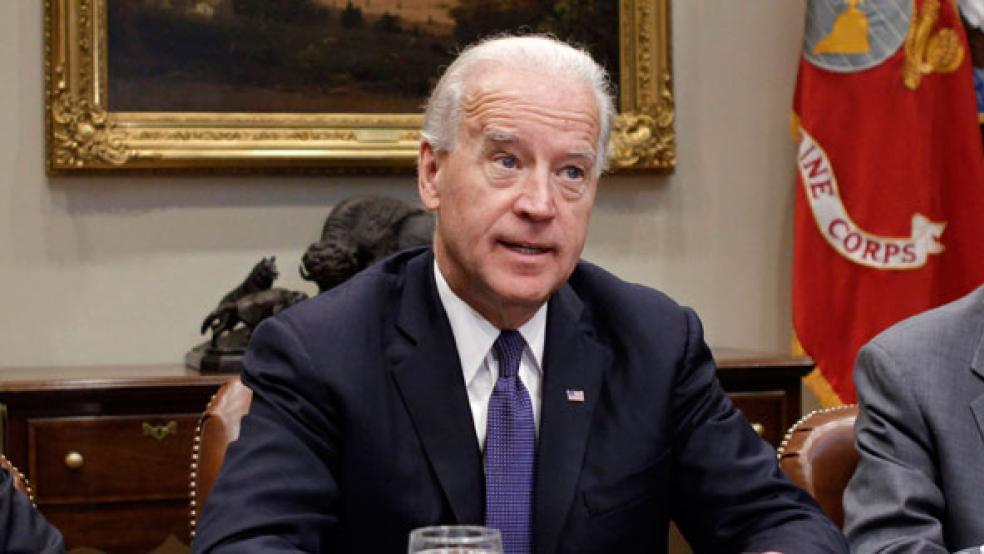Vice-President Joe Biden’s bipartisan “Gang of Seven“ will begin an intense full-court press in the week ahead in an effort to bang out a debt-ceiling deal.
Those involved in the talks have been told to take out bigger chunks of time in preparation for “around the clock discussions.” Congress and the Obama Administration have to reach an agreement to raise the debt ceiling in advance of August 2, when Treasury Secretary Tim Geithner projects the U.S. will default for the first time in history. It is widely believed that a default could seriously damage the economy and further undermine a teetering recovery. Republicans have demanded that any increase to the debt ceiling must be matched by the same level of spending cuts.
“We’re getting down to the real hard stuff,” Biden said. “I’ll trade you my bicycle for your golf clubs.”
The Biden-led negotiations—which would increase the government’s borrowing authority and chip away at the escalating $14.3 trillion national debt—have been under way for six weeks with nine separate meetings.
“We’ve almost covered the whole waterfront in the federal budget…we have gone through a first serious scrub of each of the categories that make up the total federal budget, including mandatory spending” Biden told reporters, optimistic that the group will reach its goal of wrapping up talks by July 1.
Jared Bernstein, Biden’s former chief economist, said he is uncertain if the gang will meet the self-imposed July 1 deadline but is confident “they come in well under the debt-ceiling deadline.” Bernstein says the attitude in Washington has shifted in the last few weeks. The ‘considerable economic stress’ added pressure to reach an agreement.
“There is no way you want the political process around the budget to do any damage because we’re still in a fragile recovery,” Bernstein told The Fiscal Times. “If the unemployment rate was at 4.5 percent, I would say go ahead and do three acts of political theater if that’s what you want. But at 9.1 percent, this just isn’t the time for it.”
Biden said he is determined that the group—six House and Senate Republican and Democrat lawmakers—will be able to find $4 trillion in savings from the federal budget over 10 years. “There are differences that are going to have to be bridged, and it won’t occur till the end,” Biden said.
It’s unclear exactly what preliminary cuts the gang has agreed to and what issues are unresolved. They have eyed farm subsidies and military and federal workers' pensions. Mandatory spending on non-health-care programs, including these items, accounts for approximately 12 percent of the federal budget. The gang has also discussed eliminating some special-interest tax breaks.
"On discretionary spending, which is everything from the Defense budget to the FBI to whatever, we’ve gone through all of that…the really tough stuff that's left are the…philosophically big-ticket items,” Biden said. “Anything having to do with health care--I don't mean major Medicare reform--but just changes in health-care policy."
So far Republicans have refused to consider increases in new taxes, while Democrats say touching federal health-care programs, which are major drivers of the federal debt, are out of the question.
Some budget experts say reaching $4 trillion in deficit cuts may be almost impossible given the ideological divide between the two parties.
“It would be very, very good to get $4 trillion in real deficit spending cuts. Not promises for action later,” says Steve Bell, Director of the Economic Policy Project at the Bipartisan Policy Center. “I think it would be important to markets and really important to the view whether Washington can work or not. However, to do that without touching the fundamental structure of Medicare is extremely difficult arithmetically, and we think it’s impossible politically.”
Bell, a onetime budget aide to former Republican Senator Pete Domenici of New Mexico, says the national debt is projected to rise to $23 trillion by fiscal year 2021, which would weaken the impact of even a $2 trillion debt compromise. Total mandatory federal spending amounts to $26 trillion over the next 10 years of which $22 trillion is promised to Social Security, Medicare and Medicaid payments, Bell says. Both parties have said Social Security is an issue that needs to be tackled outside of the deficit-reduction talks. Meanwhile, spending on federal and military pensions is expected to rise to $1.6 trillion over the next decade and agriculture subsidies will top $152 billion.
In order to take one step towards achieving $4 trillion in cuts, Bell suggests freezing all non-security domestic discretionary spending—which accounts for 13 percent of the federal budget—for 10 years. That would yield approximately $1 trillion in cuts, he says.
Related Links:
Biden on Debt-Reduction Talks: Negotiators ‘Getting Down to the Real Hard Stuff’ (The Washington Post) Budget Talks Address Military Retired Pay (Navy Times)
Biden, Lawmakers Determined to Cut $4 Trillion (Bloomberg)




